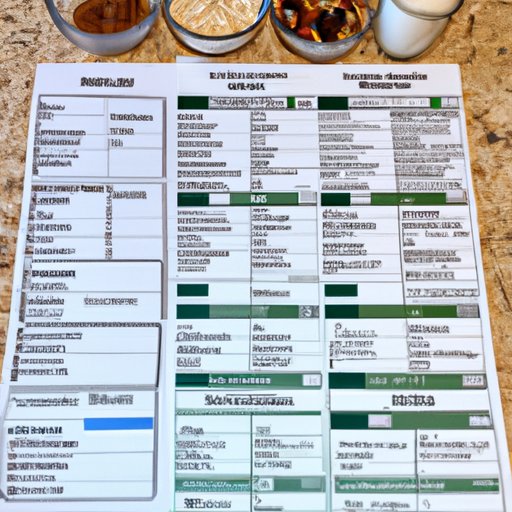Introduction
Eating a balanced diet is an essential part of maintaining good health. A balanced diet consists of eating the right types of foods in the right amounts so that you can get all the nutrients you need. It also involves making sure that you are eating enough calories to stay at a healthy weight. To have a balanced diet, it’s important to understand the basics of nutrition and portion size, plan healthy meals and snacks, incorporate whole foods into your diet, and monitor your progress.

Learn the Basics of Nutrition and Portion Size
In order to have a balanced diet, it’s important to understand the basics of nutrition and portion size. The two main types of nutrients are macronutrients and micronutrients. Macronutrients are proteins, carbohydrates, and fats, and they provide energy for your body. Micronutrients are vitamins and minerals, and they help your body function properly. It’s important to get the right balance of macronutrients and micronutrients in your diet.
Portion size is also important when it comes to having a balanced diet. Eating too much of any one food group can lead to an unbalanced diet. For example, if you eat too many carbohydrates or fats, you may not get enough of the other essential nutrients. It’s important to eat the recommended amount of each food group in order to get all the nutrients you need.

Plan Healthy Meals and Snacks
Once you understand the basics of nutrition and portion size, it’s time to start planning healthy meals and snacks. Planning ahead helps to make sure you have the right ingredients on hand and can help you avoid unhealthy temptations. When creating a meal plan, try to include a variety of foods from all the major food groups. This will help ensure that you get all the essential nutrients you need.
Incorporating healthy snacks into your diet can also help you stay on track. Snacks can help you avoid overeating at meals and can provide extra energy throughout the day. Try to choose snacks that are nutrient-dense, such as fruits, vegetables, nuts, and seeds.
Incorporate Whole Foods into Your Diet
Whole foods are foods that are minimally processed and contain all their natural nutrients. Eating whole foods is an important part of having a balanced diet. Whole foods are rich in vitamins, minerals, antioxidants, and fiber, which are all essential for good health. They also contain fewer calories than processed foods, so they can help with weight loss and management.
Examples of whole foods include fruits, vegetables, nuts, seeds, legumes, whole grains, eggs, and lean meats. Incorporating these foods into your diet can be as simple as adding a few extra servings of fruits and vegetables to your meals, snacking on nuts and seeds, or swapping out refined grains for whole grains.

Monitor Your Progress and Adjust as Needed
Monitoring your progress is an important part of having a balanced diet. Keeping track of what you eat can help you stay on track and identify areas where you may need to adjust. If you find that you aren’t getting enough of certain nutrients, you can adjust your diet accordingly. You can also use tracking tools to help you stay motivated and accountable.
If you find that you are still having difficulty achieving a balanced diet, you may want to seek professional help. A registered dietitian can help you create a personalized meal plan and provide guidance on how to reach your nutrition goals.
Conclusion
Having a balanced diet is important for overall health and wellbeing. To have a balanced diet, it’s important to understand the basics of nutrition and portion size, plan healthy meals and snacks, incorporate whole foods into your diet, and monitor your progress. With the right knowledge and commitment, you can achieve a balanced diet that nourishes your body and keeps you feeling your best.
(Note: Is this article not meeting your expectations? Do you have knowledge or insights to share? Unlock new opportunities and expand your reach by joining our authors team. Click Registration to join us and share your expertise with our readers.)
